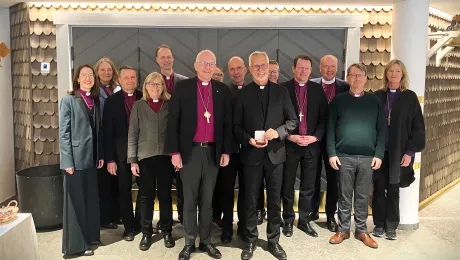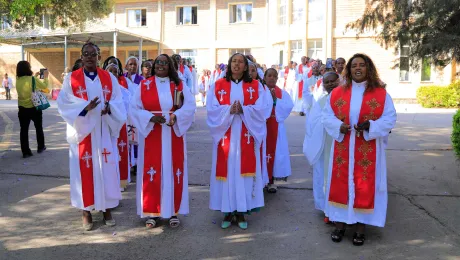
Dr Rolf Jacobson. Photo: Luther Seminary
Dr Rolf Jacobson
Singing the Songs of the Lord in Foreign Lands: Psalms in Contemporary Lutheran Interpretation (LWF Documentation 59), edited by Kenneth Mtata, Karl-Wilhelm Niebuhr, and Miriam Rose (Leipzig: Evangelische Verlagsanhalt, 2014) is a rich resource on Lutheran interpretation of the Psalms that every person who desires to be conversant either with Psalms’ scholarship or Lutheran hermeneutics would do well to study. There are marvelous resources here regarding both how the Psalms should be studied and read as well as how Lutherans in various contexts read the Bible.
The volume publishes papers that were presented at the second international consultation on Lutheran hermeneutics held in Eisenach, Germany, in 2013. The conference welcomed Lutherans from all seven regions of the LWF as well as select ecumenical guests in order to focus on the Psalms as a test case “to explore how we read the Old Testament together as Lutheran churches in our different contexts” (p. 9). The 16 essays are divided into six categories:
- I. Hermeneutical approaches and Challenges
- II. Psalms Exegesis: Methodologies Past and Present
- III. Difficult Topics in Psalms and their Lutheran Interpretation
- IV. Psalms from the Old Testament and their Reception in the New Testament
- V. Luther’s Interpretation of the Psalms from a Contemporary Perspective
- VI. Contextual Approaches to the Psalms.
Three broad themes emerged from the collection of essays regarding Lutheran hermeneutics and the interpretation of the Psalms. First is the theme of Luther as a hermeneutic (as opposed to Lutheran hermeneutics more broadly). Much more attention was paid to the contributions that Luther made to hermeneutics—especially regarding the interpretation of the Psalms and the Old Testament—than to the contributions of the Lutheran confessional writings or of Lutheranism as a theological movement. Perhaps this was due to the titles and topics that the presenters were invited to address, but the volume points to the heritage of the Reformer himself as an interpreter as a promising point of contact for contemporary Lutheran hermeneutical convergence.
Second, is the theme of human existence and existentialism. If any one theological theme might emerge from this volume that could offer a hopeful focal point around which Lutheran communities from around the world might continue to explore theological interpretation of the Bible it is the theme of relating any interpretation of the Psalms to the actual existential realities of flesh-and-blood human beings. The Psalms are not theological poetry in an abstract sense but genuine paeans of praise and cries for help from ancient believers. The Psalms thus give us vocabulary and forms with which to live out our existences before the living God. The essays in the volume consistently return to this theme.
Third, are the related themes of justice, violence, the enemies, and the vengeance Psalms. Perhaps because of the cultural moment in 2013, many of the essays addressed the topic of how the Psalms speak from deep situations of injustice and often call for the God of justice to act against those who violently enact injustice. Any global Lutheran conversations about scriptural hermeneutics will have to continue to include major focus on injustice and violence and the responses of both God and the believer to the same.
A few absent—or nearly absent—elements in the volume should be mentioned. First, as already noted, the volume included little or no sustained interaction with or reflection on either the Lutheran confessional writings or on traditional Lutheran hermeneutical categories such as law and gospel, sola scriptura, two kingdoms, “for us” and “from outside us,” and the like. I found the absence regrettable. Included here is a silence on the history of Lutheran interpretation of the Psalms. Most of the attention in the volume to the history of interpretation focused more broadly on matters such as the history of form criticism or the newer Psalter-exegesis. It seems, however, that part of a conversation on global Lutheran hermeneutics ought to include honest deliberation about past Lutheran hermeneutics.
Second, the volume did not attempt to harvest the insights from the divergent papers and draw any conclusions about the promises, prospects or challenges of global Lutheran hermeneutics. The introduction by the three editors merely describes the book’s contents and did not attempt to tease out either any commonalities, important points of disagreement, or even any key questions that need to be pursued in future consultations. The volume did not include a conclusion. This reader believes an opportunity was missed to sum up the contributions of the published essays and to chart a future course or, at the very least, to point ahead to key milestones and compass points for the journey ahead.
Third, most of the essays exhibited a strange silence about God. This is fairly normal for academic conferences of this sort—the focus usually is on interpretive method, or the history of interpretation, or on particular interpreters, and the like. But given Martin Luther’s rediscovery of the gracious God of the church’s gospel and given Lutheranism’s consistently evangelical proclamation of the risen Christ who is “for us,” this reviewer would have hoped that the volume would have included more attention to the question of what sort of God it is that we encounter when we read, pray, sing, and study the Psalms. After all, the power of the Psalms to mediate a relationship with the living God in all of life’s circumstances is what accounts for the enduring power and popularity of the Psalms.
The organizers and supporters of the 2013 Eisenach conference and the editors of this volume are to be thanked for this rich and diverse volume on Lutheran hermeneutics and the Psalms. As already stated, the volume is an important read for any serious student of the Psalms or Lutheran hermeneutics of the Old Testament. As soon as I turned the last page, I felt the urge to open the cover and start reading again at the beginning.
Rolf Jacobson is Associate Professor of Old Testament at Luther Seminary, Saint Paul Minnesota, USA.
Copies can be ordered from: [email protected] or downloaded free of charge


